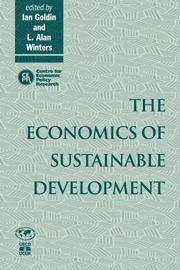Book contents
- Frontmatter
- Contents
- List of figures
- List of tables
- Preface
- Acknowledgements
- List of conference participants
- 1 Economic policies for sustainable development
- PART ONE GROWTH AND THE ENVIRONMENT
- 2 Pollution and growth: what do we know?
- Discussion
- 3 Does sustainability require growth?
- Discussion
- PART TWO SUSTAINABILITY
- PART THREE DOMESTIC POLICY
- PART FOUR INTERNATIONAL POLICY COORDINATION
- Index
3 - Does sustainability require growth?
Published online by Cambridge University Press: 04 August 2010
- Frontmatter
- Contents
- List of figures
- List of tables
- Preface
- Acknowledgements
- List of conference participants
- 1 Economic policies for sustainable development
- PART ONE GROWTH AND THE ENVIRONMENT
- 2 Pollution and growth: what do we know?
- Discussion
- 3 Does sustainability require growth?
- Discussion
- PART TWO SUSTAINABILITY
- PART THREE DOMESTIC POLICY
- PART FOUR INTERNATIONAL POLICY COORDINATION
- Index
Summary
Introduction
‘Sustainable development’ is often defined as development that meets the needs of the present without compromising the ability of future generations to meet their own needs. The conveniently flexible word ‘needs’ renders this definition inoperable. To economists ‘sustainability’ suggests a steady state and this is the interpretation that will be used here. One of the many issues surrounding sustainability is the growth controversy. Some analysts argue that the world has already reached its limits of growth and that further growth will take the planet further away from sustainability. Indeed Daly (1990) argues that ‘sustainable growth’ is a contradiction in terms. The line of reasoning advanced by this school is often eclectic. For instance, Goodland and Daly (1992) argue that ‘the North should stabilize its rate of resource consumption to free resources for the South and to free up ecological space as well’. It is not exactly clear which resources and space are being referred to, but the authors go on to state that ‘the North can continue to develop but must cease increasing throughput growth. If the expanding global economy is bounded by a finite inexpandible [sic] ecosystem, then … the traditional view becomes impossible.’ The ‘traditional view’ is characterised as one in which Northern growth is essential to alleviate Southern poverty. Other researchers, such as MacNeill (1989), argue that growth is greatly needed to further development and prevent environmental degradation. The World Resources Institute (1992) argues that ‘alleviating absolute poverty also has important practical consequences for sustainable development, since there are close links between poverty, environmental degradation, and rapid population growth’.
- Type
- Chapter
- Information
- The Economics of Sustainable Development , pp. 51 - 78Publisher: Cambridge University PressPrint publication year: 1995
- 20
- Cited by

